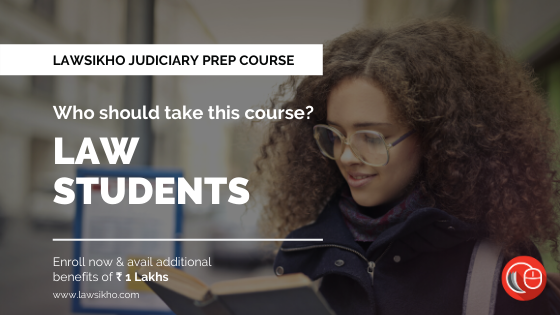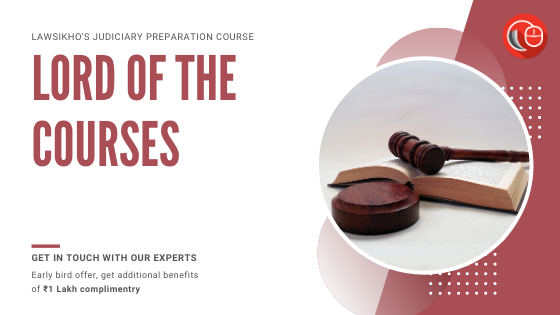This article is written by Priyanka Cholera, a student of MKES College of Law, Mumbai University.
Table of Contents
Guest Speaker:
Anubha Jindal did her BCom (LLB) from Panjab University, Chandigarh (2nd topper, Batch 2013-18). Moreover, she is pursuing LLM from Panjab University, Chandigarh. She appeared not only for one but four judicial services examination and achieved Rank 8, in Punjab Judiciary, Rank 11, in Haryana Judiciary Rank 25, Rajasthan Judiciary and cleared Delhi Mains of which (Interview pending), she has also won National Moot Court Competition.
Host:
Anu Bhatnagar, Webinar Executive, LawSikho
How did you choose law? And what motivated you for Judiciary?
Ms. Anubha says that she began studying Law to be a Judicial Officer. From the first day of college, she knew her goal very well and I Planned my 5 years accordingly.
Her parents always wanted her to be a Judicial Officer and that dream Materialized after joining law.
When to start with judicial preparation?
She believes that there are ideally two categories of Students who opt for Judiciary, First ones like herself, who know early on from their college that they want to opt for law and others, who are still weighing their options.
If you are in college and you have decided to opt for Judiciary, it is recommended join coaching classes from your 4th Year (if you’re in the Five Year Course) because then you will have plenty of time to make notes and your 5th year will keep you very busy, so best to start early and if you decide later, there’s no need to be worried.
Just start preparing as soon as you decide, everyone’s timelines are different.
What strategy did you apply for preparation and time management?
As she mentioned earlier, she joined coaching from the Fourth year itself, and by the time she graduated, all her notes were ready. And after college, she began with self Study.
According to Anubha’s personal experience, Self-Study is the key for cracking any Judicial Exams, Coaching will spoon-feed and handhold you about the concepts and techniques, but the real work needs to be done by the student.
She started preparing with major Subjects like IPC, CrPC and CPC, Evidence and Family Law (because her main aim was clearing the Punjab Judiciary and Family Law is an Important Chunk of Syllabus), she completed the major subjects before proceeding to the Niche ones.
She gave 8 hours of her time every day to cover all subjects.
What was your strategy for preparing notes for Self Study?
Start with your textbooks, Anubha used Textbooks to prepare for all the main subjects like IPC, CPC, CrPC. One can also use the textbooks that he/she had used for College. The note-making process is as old school as our usual note-making process, Highlight points that are important for you. In her note-making process, whenever she studied any topic, she left space for extra notes that might be added from law news sources, for Judgments, etc.
She made sure that her notes are very specific and short notes for the main exams so that when the occasion comes, she can just look through all the notes.
During preparing for her Delhi Judiciary, ‘LiveLaw’ was very helpful as in that Judicial Exams, many questions are based on recent Judgements.
The same strategy helped her to take the Haryana and Rajasthan Judicial Exams too.
And there is no thumb rule that one has to go for coaching; going for coaching just smoothens the road a bit.
Many students clear the Judiciary without any help from coaching.
How did you prepare for the preliminary examination?
Once you receive the notification regarding the prelims, you should start preparing for Prelims; Revising Bare Acts (only) is Sufficient for Prelim’s Preparation. Anyway, Judicial Exams need wholesome Preparation, which includes Bare Acts plus notes. But for Prelims, As soon as you are notified about it, start being well versed with the Bare Acts e.g. Knowing all the Sections and explanations, etc is very important. and General Knowledge, that includes knowing about Latest Case Laws. If you’re confident about the preliminary, that will boost your confidence about the Main Exam, as well.
Anubha shared her experience that she appeared for the Judicial Examination, same year she Graduated, hence she had 2-3 months to prepare. Although there are books available for MCQ’s for Preliminary, she relied on past papers only to help her prepare.
Even if the questions don’t repeat (as one might hope it will), students will be aware of the Paper Patterns, because different states have different types of Questions; Rajasthan had Hindi Language related questions, Delhi had contextual questions, for Delhi exams, one has known concepts beyond bare acts.
From her experience70% of her question paper was based on past papers. Hence previous year papers are very important.
What was your approach for learning and remembering Sections of the Act or Code for Prelims?
Instead of trying to remember the Section number, try to understand the Concept. Because mugging up the numbers won’t lead you anywhere. Revise and Repeat. Keep visiting the sections repeatedly until you get the hang of it.
If you have friends or Colleagues preparing for Judiciary as well, Discussing Concept with Peers, helps a lot too.
How to Prepare for Language, General Knowledge and Case Laws related Questions, in Prelims?
Generally, in all state Prelim exams cover the Language and GK part, Delhi has the GK portion in main exams too. The best way to prepare for GK is to maintain consistency in making notes from newspapers regularly, to be honest, all newspapers collectively give 2-3 major points that are relevant for your Judicial examination, so it isn’t as difficult as it appears to be.
There youtube channels like StudyIQ that help in keeping you updated about Current Affairs, referring Magazines are also recommended.
Anubha says, she wasn’t confident about the Hindi Language, that was in portion for the Rajasthan Judicial Exams, So for concepts like those, referring past papers and taking help from YouTube Channels, sailed her boat.
Case Laws are important from the Main Examination point of view too. Not only recent ones but LandMark Judgements are also important to remember. E.g. for the topic of Arrest, to be aware of the DK Basu case Judgement is important. One can refer to various Subject Material available online and past papers too.
For studying recent Case Laws, it is important to do Smart Work. Because remembering all the Recent Case Laws for a decent number of Subjects is very difficult. Hence just be aware of what is important from the exam point of view and prepare accordingly.
How did you prepare for the MAIN examination?
The most important step is Making an Ideal Time Table and keeping Targets. Anubha shares that she used to start her day early in the morning to study and try to maintain Targets for each month. She had slots for study time divided between breakfast and Lunch. Also, she had added leisure time to her timetable. Studying GK was kept at the end of the day when the Brain is exhausted to intake any Study Material.
As she mentioned earlier, she made concept specific notes and made sure she had at least one Case Law per Topic. Her tip for writing exams is to write answers that very specific in nature, don’t beat around the bush. Even for 20 marks question 2 pages are enough. Make your answers crisp and precise.
If you co-relate your answers to Laws outside the ambit of the question, e.g. if the question is from IPC you can relate laws from CrPC or Constitution too, that adds an edge to your answers and shows your aptitude, it advisable to write at least one case law per question.
Completing the paper is also very crucial, we usually prioritize writing what we know best first, but instead of that try to manage the paper with a timeline, there are chance you’ll run short of time to complete it but if time isn’t a luxury at that moment, shorten the answers, BUT ANSWER ALL QUESTIONS.
How did you prepare for Delhi Judiciary Mains?
Anubha shares her experience, in Delhi Judicial Exam, questions to a great extent are based on Practical Aspects or Latest Judgements, hence one must be aware of the issues upon which the question is based, in 2-3 lines, Then add provision related to the question and if you can add case laws related to it, then it’ll truly be an ideal Answer.
If you’re clear with concepts, aware of the Judgements, and reason your answers logically and correctly, Delhi Judicial Examination will be achievable for you.
Did you prepare templates for lengthy answers?
No one can predict what type of questions will be asked, hence opting to make templates is not reasonable. But certain provisions are extremely important from the exam point of view, so it is important to make notes in such a pattern that, if a question is proposed on it, you can derive the answer from your notes. If during an exam, the student feels that answer will not suffice as content, one can always write essentials of the provisions to increase the length and quality of the answer.
E.g. – In Haryana Judiciary Exam, there was a question on Discharge of Contracts, so instead of writing everything in detail, Anubha says she opted for Flow Chart, to explain the steps of Discharge of Contract and she concluded concepts and Case Laws in 2-3 lines because it isn’t feasible to the writer in-depth about every provision when you have other questions to attend too.
How did you answer General Knowledge questions?
In Delhi Judicial Exams only students faced questions on GK in the English Language Exam Paper itself, according to Anubha’s experience.
There were questions on AI, Chandrayan, etc. and for those, she referred IAS (or Civil Services) notes, there are questions based on Religion, Education, Women Empowerment for Essays, so it can be Summed up In 2-3 pages, it is important to write about the latest news or information regarding the essay you have chosen to write.
How did you prepare for Judgement Writing Exercise?
Ms. Anubha came across the question of Judgement writing only in Rajasthan Judiciary Exams. She referred to the book for previous exam questions and practiced it a couple of times. For judgment writing there is format and chronology that one has to follow, writing the brief Facts of the case, the contentions from Petitioners and Respondents as well as if there is any evidence provided, then to correlate it to the case and giving an opinion on it, finally passing the Judgement.
How to prepare for the Interview Round?
Your knowledge has already been tested, through your examinations, hence the interview round is to judge your personality. So it is important to know the basics of the law and the current affairs. As Anubha was a fresher, she was interviewed regarding the Current Affairs, Case Laws, recent news, family background, etc.
As one has already studied enough material on case laws and Laws in general, so just revision will work, and keeping up General Knowledge and Current affairs is very important.
She also shares that, in her interview, the Interviewers were cordial and made sure she was comfortable.
It is advisable to be calm and not run in circles, if you don’t know the answer to any question, just be humble and admit it.
Can you share your personal experience?
Ms. Anubha shares her experience of Rajasthan Judicial Interview, she was questioned about a few particular sections of CrPC and IPC, regarding their context and implementations. Similar Experience during Punjab and Haryana Interview.
She had a very pleasant experience in regards to the Interview Round.
Questions by Audience
How to cover CPC for Judiciary exams?
For CPC being thorough with Bare Acts and knowing important topics from past papers and Judiciary points of view is ideal for preparation. e.g. concepts like Orders, Res Judicata, Representative Suits, etc. Write, section no. provision and Order no and Judgements.
How to prepare for CrPC and CPC landmark Judgements?
Anubha says she prepared maximum of her syllabus through self-study, hence often while reading when she came across a Judgement too many times she marked it as important, and often the book you’re referring will mention and important judgments, but it is always wise to go through several references like Coaching Notes, Past Paper, Graduation Notes, etc.
How did you prepare for Local Laws?
Mainly Rent Law differs in every state, and even in that, the framework is similar for all states. So for local laws of different states, she prepared through Bare Acts only and Past Papers. In her experience questions on Local Laws do not hold many marks on their account.
How did I prepare for 4 different States?
Primarily while making notes, Aubhav says she covered everything, she possibly could, and she was very well versed with major concepts like IPC, CrPC, and CPC. And 60-70% portion is common for all state exams, that helped too. The Rajasthan Judicial Services Hindi Language paper was a bit Technical, but it was doable with the Study Material in a couple of weeks. She advises students to focus on a maximum of 3 states, not more than that, because any more than that, increases chances of burn out are high.
Can you refer to some reliable references?
IPC by PSA Pillai, CPC by C.K Takwani, CrPC by R.V Kelkar, Evidence Act by Batuklal, Muslim Family Law by Aqil Ahmed, Hindu Family Law by Punamkar Dhan, For Minor laws, she referred AK Jain and Contract by Avatar Singh.
What to refer to MCQ’s?
For Prelims, Universal’s is preferred and Past Paper, and for Mains in Punjab and Haryana, Shailender Malik, and Chawla’s.
LawSikho has created a telegram group for exchanging legal knowledge, referrals and various opportunities. You can click on this link and join:
 Serato DJ Crack 2025Serato DJ PRO Crack
Serato DJ Crack 2025Serato DJ PRO Crack












 Allow notifications
Allow notifications


